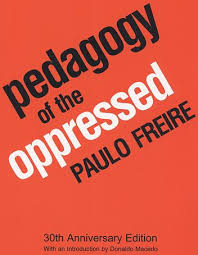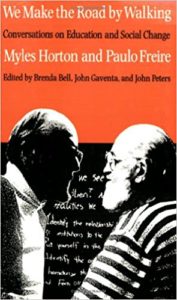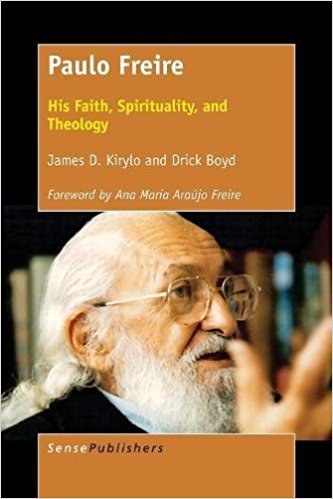This past week (October 18-19) I had the privilege of attending the Freire50 conference at the University of South Carolina commemorating the 50th anniversary of the publication of Paulo Freire’s groundbreaking book, Pedagogy of the Oppressed. There were approximately 125 people in attendance for those two days. We were diverse group of students, popular organizers and educators, all of whom in some way had been deeply impacted by the life and writings of this revolutionary Brazilian educator. Though Freire died over twenty years ago in 1997, his legacy lives on in people seeking to provide emancipatory education for students at all levels of society, from small children to adults.
The conference opened with a deeply moving address by Dr. Antonia Darder, professor of Ethics and Moral Leadership, at Loyola Marymount University, on the “Pedagogy of Love.” Words can not do justice to the power of her presentation, but in essence she reminded us that our work for justice in the classroom and in society at large is to engage in a revolution grounded and directed in love. Speaking of her own life and work, she reminded us that “We are in the world to change it.” She not only spoke of love, but embodied that love in the way she graciously opened herself to all in attendance.
On the second day, Dr. Ira Shor, a professor of English at Staten Island Community College, co-author with and longtime friend of Paul Freire, walked us through the historical events that led to Freire’s emergence as one of the most revolutionary educators of the 20th century. He reminded us of Freire’s claim that education was never politically neutral and how Freire’s method of teaching illiterate peasants to read so they could pass a literacy test and vote, contributed to the coup that forced him to go into exile for 16 years. Shor reminded me that the tragedy of Freire’s exile from his beloved Brazil was unintentionally Brazil’s gift to the world, for had Freire not been driven out of his own country, he might never had the global influence on education he has had.
Many of us who attended came to share our own research. I presented a paper entitled the “Pedagogue and the Preacher,” comparing Freire’s concept of Utopia with Dr. Martin Luther King’s vision of the Beloved Community. My point was to highlight the fact that while these two revolutionary leaders joined with others in their contexts to resist oppression and fight injustice, they were largely motivated by visions of a preferred future of social equity, grassroots democracy, racial justice and economic dignity. I also had chance, with my co-author James Kirylo, to talk about Freire’s spirituality from our 2017 book, Paulo Freire: His Faith, Spirituality and Theology.
However, there were many presentations that challenged, informed and inspired me. Aaron Coleman a PhD history student from Duke shared stories of the women in the lives of Paulo Freire and Myles Horton (Freire’s American popular education counterpart) and how these men would not have become who they did without significant input from women in their lives often overlooked. Josue Lopez, a brilliant doctoral student from the University of Connecticut drew parallels and connections between Freire’s work and that of Algerian philosopher Franz Fanon. I heard stories of anti- racist education in South Africa, empowerment of Latinx university students in Wisconsin, and efforts for justice in repressive states like Turkey and Brazil. However, the highlight for me was a panel of community educators who were using Freirean methodology to bring about social change in urban and rural communities across the country. I was reconnected with my dream of promoting popular education in Philadelphia in a way that empowers everyday folks to make change from the ground up.
 While many of the names of issues and authors may only be familiar to some, what was most profound was the sense of community and connectedness among the folks gathered together. I found it so affirming to be with other folks committed to education that not only educates but transforms lives, communities and whole societies. It was humbling to learn of the incredible work that is going on in colleges, underfunded schools, community halls and street corners, and the men and women who see their roles as being a force of transforming justice. So often the work for justice can make one feel isolated and alone, but this brief gathering reminded us we are all together in solidarity as we seek to build a new society based on the conviction that all persons deserve to be regarded with dignity, to create a society free of all forms of crippling oppression, a society where gross inequities of wealth and privilege no longer exist, a society that guarantees every person basic human rights so long denied.
While many of the names of issues and authors may only be familiar to some, what was most profound was the sense of community and connectedness among the folks gathered together. I found it so affirming to be with other folks committed to education that not only educates but transforms lives, communities and whole societies. It was humbling to learn of the incredible work that is going on in colleges, underfunded schools, community halls and street corners, and the men and women who see their roles as being a force of transforming justice. So often the work for justice can make one feel isolated and alone, but this brief gathering reminded us we are all together in solidarity as we seek to build a new society based on the conviction that all persons deserve to be regarded with dignity, to create a society free of all forms of crippling oppression, a society where gross inequities of wealth and privilege no longer exist, a society that guarantees every person basic human rights so long denied.
Many thanks to Dr. James Kirylo and his colleagues at the University of South Carolina, for providing the time and space for this gathering of like-minded folks gathered to remember and be inspired by the powerful example of the little bearded man from Recife.

